This quick and easy recipe for oven-roasted asparagus is the perfect spring side dish. This basic recipe can be seasoned many different ways—add lemon juice, garlic, or shaved parmesan for variations.
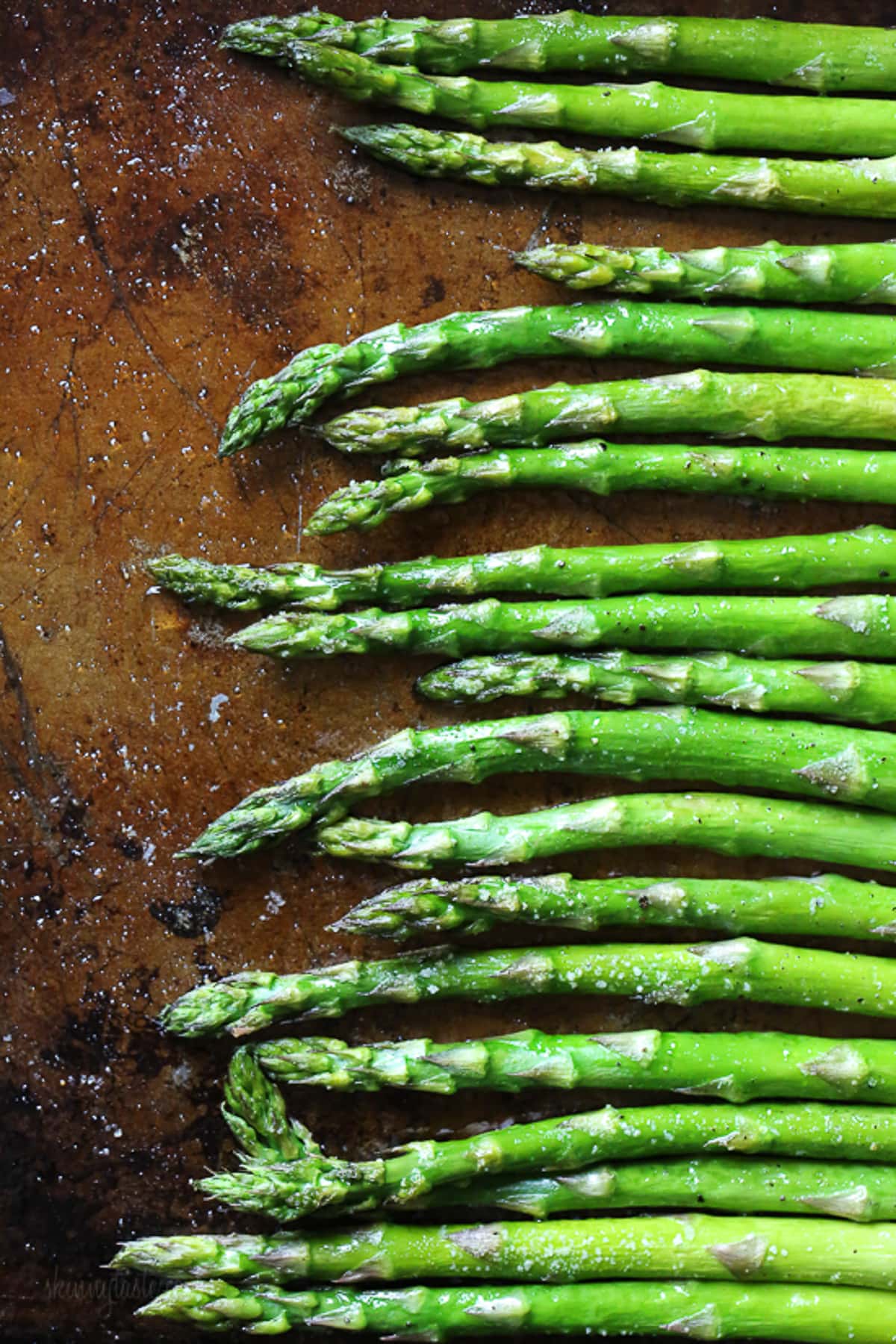
Roasted Asparagus
Roasted Asparagus is a super easy side dish that goes well with almost anything, like chicken, steak, salmon, baked ham, and pork. It’s great for a quick weeknight dinner or any holiday side dish. I live in a very divided house when it comes to asparagus. Half of us love it, and the other half… not so much! But I still make this roasted asparagus and toss the leftovers in my salads, with eggs, or just heat it up for lunch. Roasting asparagus is a delicious and simple way to prepare this nutritious vegetable. Here’s a basic recipe to get you started:
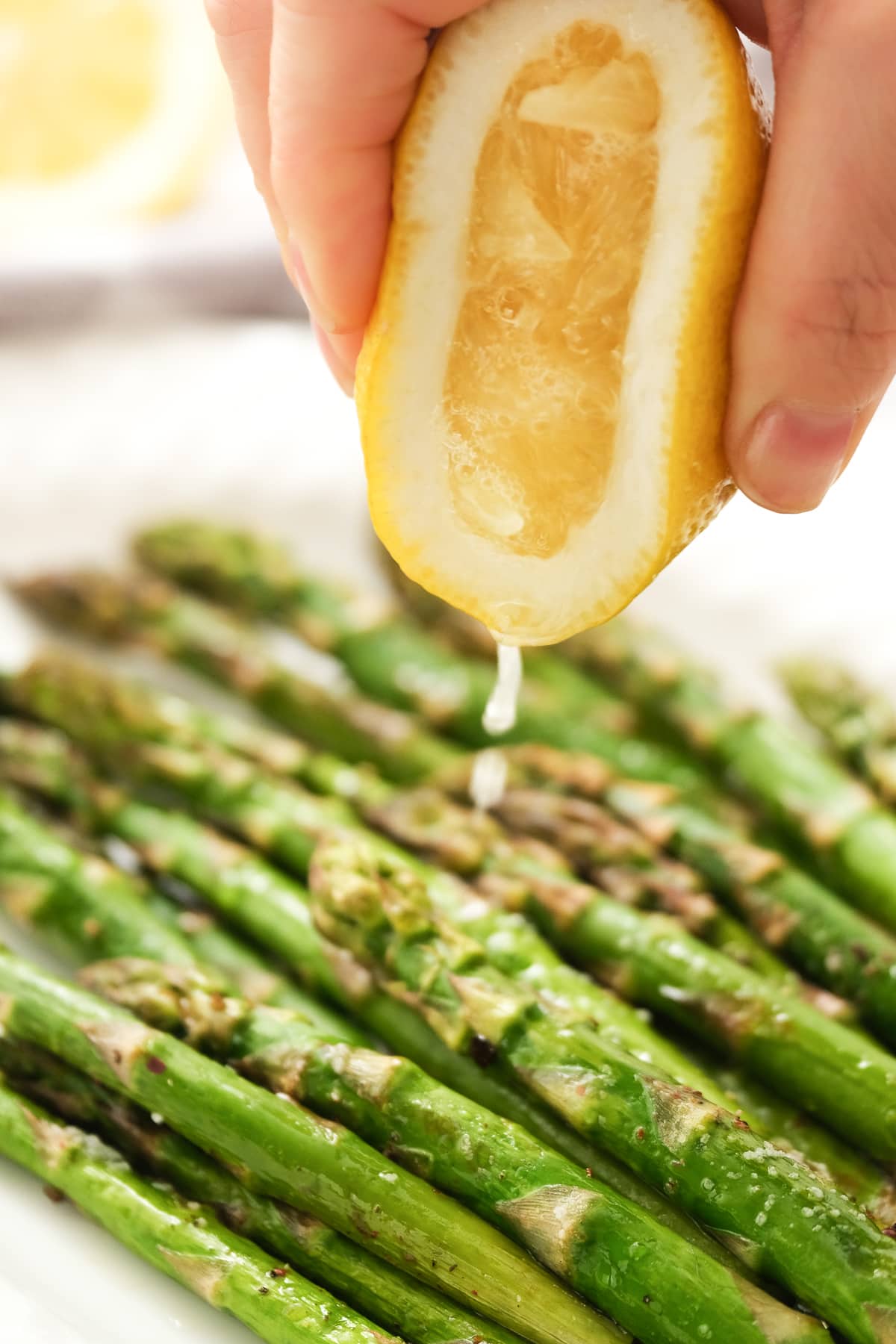
Why You’ll Love This Roasted Asparagus Recipe
- Easy: It doesn’t get much easier than this asparagus recipe. Just prep and season the asparagus and throw them in the oven.
- No Chopping Required: You only have to snap the tough ends off the spears.
- Quick: Since asparagus are so thin, they only need about 10 minutes to roast, which is much faster than many other veggies.
- Nutritious: These healthy roasted asparagus are packed with vitamins A, C, and K and iron. They’re also a great source of protein and fiber.
What You’ll Need
To make this basic recipe you will need a bunch of asparagus, olive oil or olive oil spray, kosher salt and fresh black pepper.
(See full recipe below in the recipe card.)
How to Roast Asparagus
Roasted asparagus is versatile and pairs well with a variety of dishes, making it a perfect side for weeknight dinners or special occasions. This simple method will give you tender-crisp asparagus:
- Preheat the Oven: Set your oven to 400°F. This temperature is ideal for roasting asparagus.
- Prepare the Asparagus: Rinse the asparagus under cold water to clean then dry. Trim off the tough woody ends of the asparagus spears. This can be about 1-2 inches from the bottom, or you can find the natural breaking point by gently bending the spear until it snaps.
- Season the Asparagus: Place the asparagus on a rimmed baking sheet. Spray with oil and season with salt and pepper to taste.
- Arrange for Roasting: Spread the asparagus in a single layer on the baking sheet. Make sure there’s a little space between the spears so they roast properly rather than steam.
- Roast: Place the baking sheet in the preheated oven. Roast for about 12-15 minutes, or until the asparagus is tender and lightly browned. Thinner spears will cook faster, so adjust the time accordingly.
- Serve: Once done, you can optionally squeeze a bit of lemon juice over the asparagus for a fresh zing or top with a sprinkle of grated Parmesan cheese for a savory finish. See more ideas below.
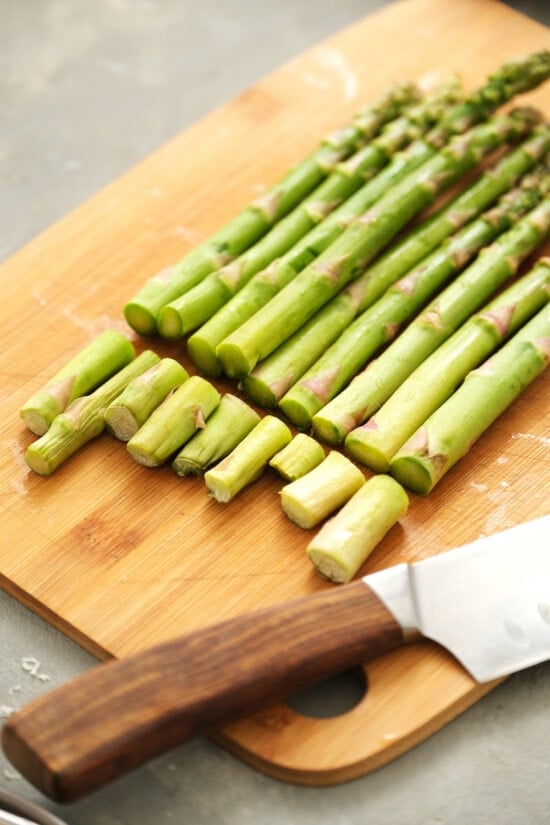
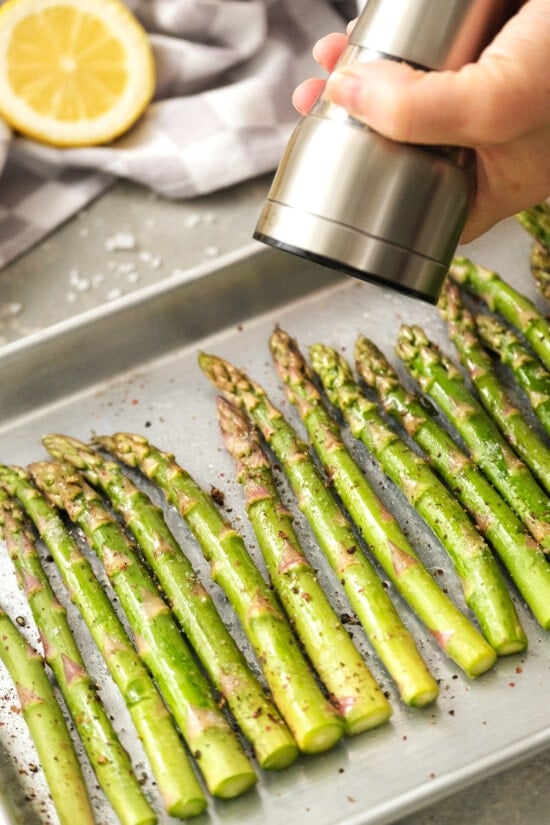
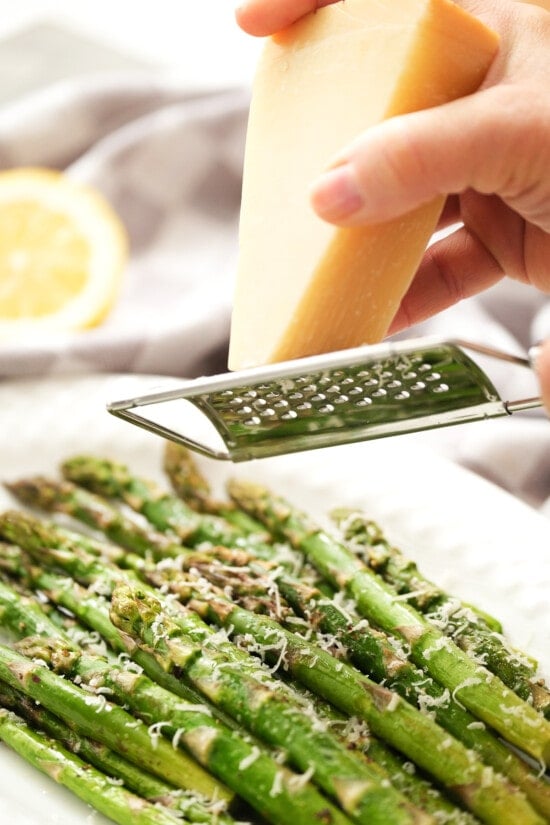
Roasted Asparagus Ideas and Variations
- Lemon: After the asparagus stalks are roasted, squeeze some fresh lemon juice or zest a lemon on top.
- Cheese: Top the veggies with 1 ounce of shaved parmesan or crumbled feta cheese.
- Melted Cheese: Sprinkle the asparagus with mozzarella or Swiss cheese in the last minute of cooking and let it melt for cheesy asparagus.
- Garlic: Add a minced garlic clove to the spears before roasting.
- Seasoning: Switch up the flavor by using lemon pepper, red pepper flakes, onion powder, or garlic powder.
- Vinegar: Drizzle with balsamic vinegar.
- Fresh Herbs: A sprinkle of chives, parsley or basil at the end adds freshness and flavor.
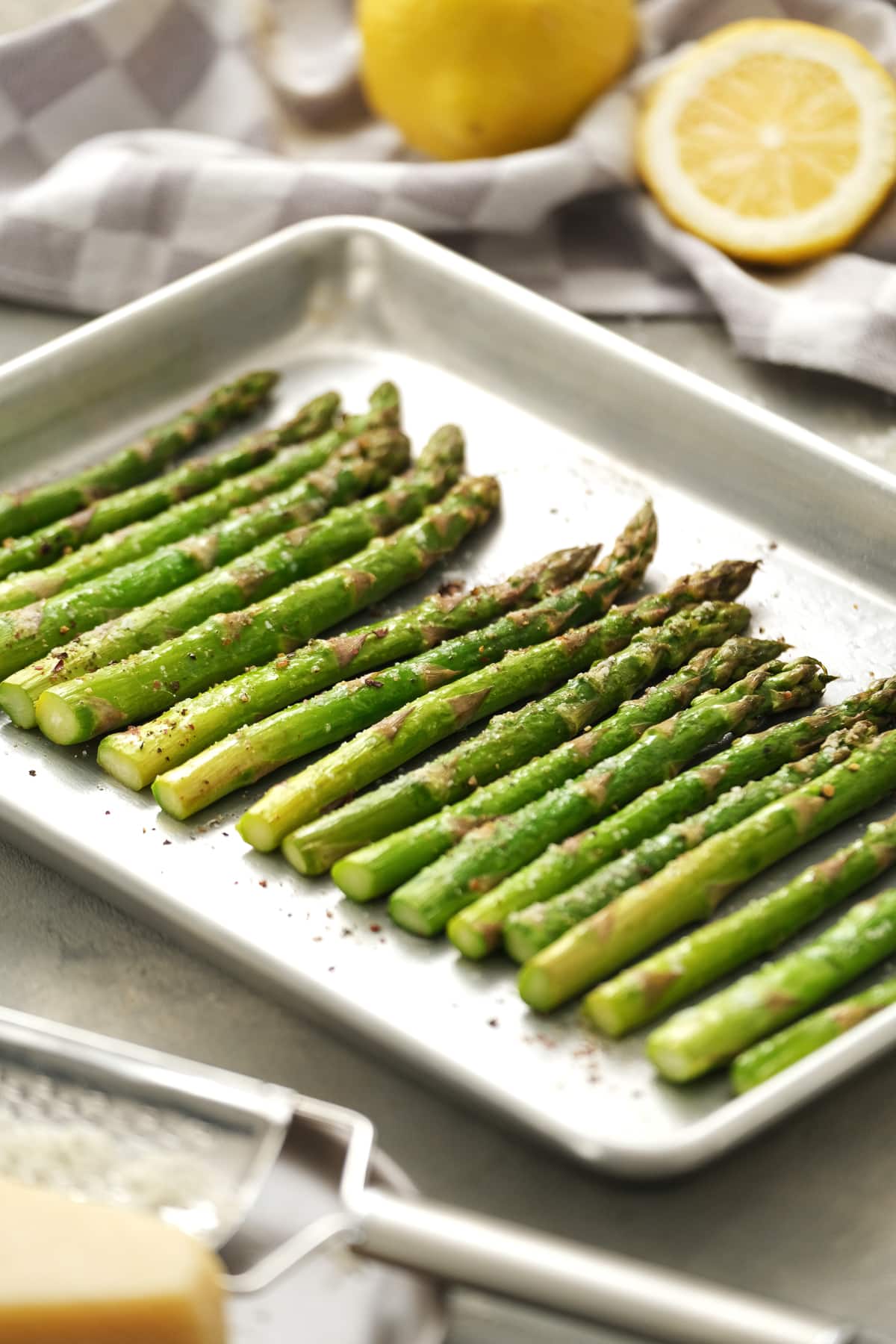
What to Serve with Roasted Asparagus
This roast asparagus recipe is versatile and would be great with any protein and starchy side dish. Below is a list of ideas.
Leftovers
Store asparagus in the refrigerator for up to 4 days. You can reheat in the microwave 1 to 2 minutes.
Asparagus: A Superfood for Digestive Health, Immunity, and Beyond
Asparagus is indeed a superfood, making it a must-have in any diet aiming for nutritional completeness and disease prevention. This vegetable is not just delicious but also offers significant health benefits in every serving.
It’s packed with fiber for digestive health, folate for DNA synthesis, and vitamins A, C, and E for immune support, skin health, and vision. It’s rich in antioxidants and the amino acid asparagine, promoting a healthy heart and reducing disease risk.
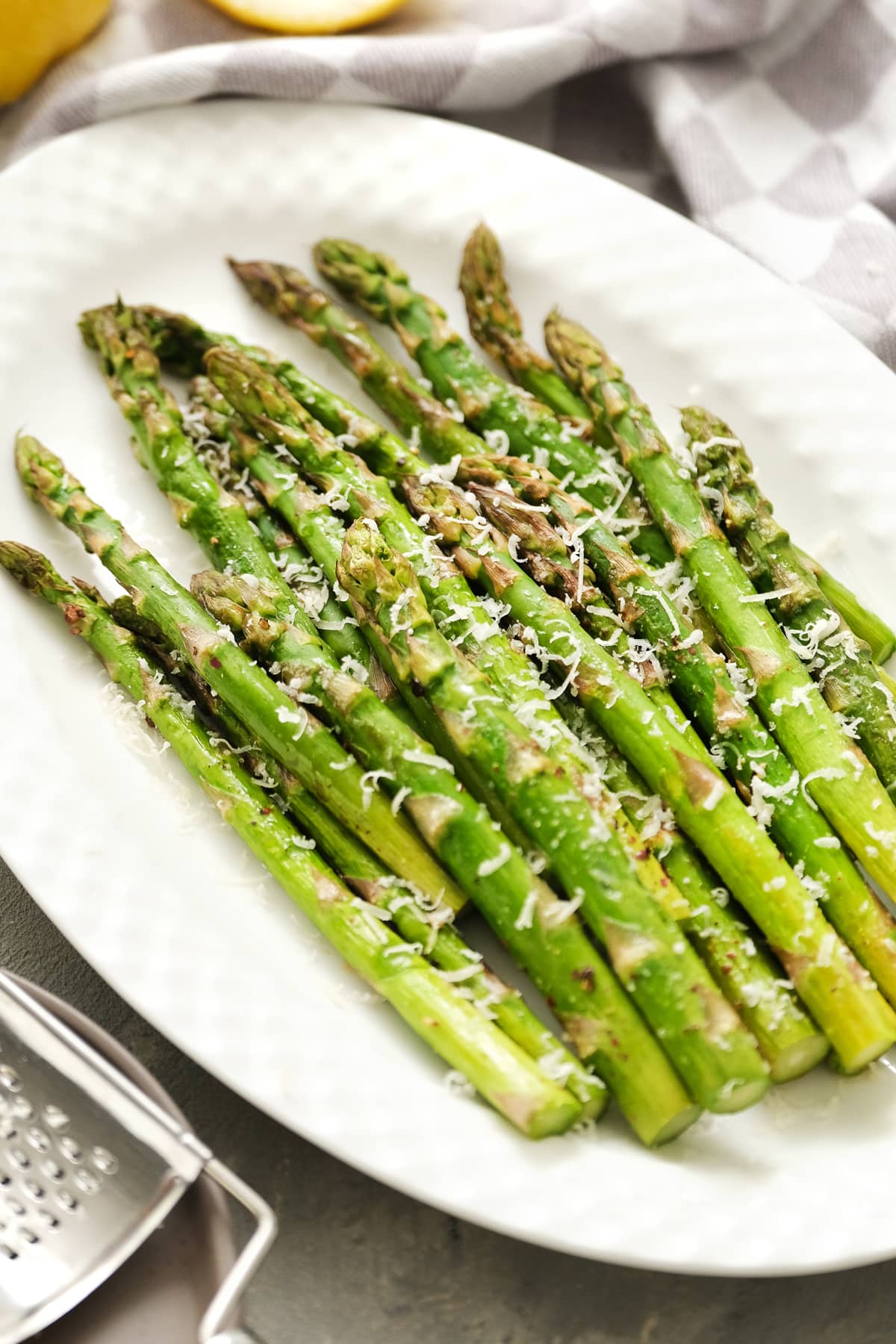
More Asparagus Recipes You May Enjoy:

Yield: 4 servings
Serving Size: 4 ounces
-
Preheat the Oven: Set your oven to 400°F (205°C). This temperature is ideal for roasting asparagus, allowing it to become tender and slightly caramelized.
-
Prepare the Asparagus: Rinse the asparagus under cold water to clean. Dry the spears with a kitchen towel. Trim off the tough bottom ends of the asparagus spears. This can be about 1-2 inches from the bottom, or you can find the natural breaking point by gently bending the spear until it snaps.
-
Season the Asparagus: Place the asparagus on a baking sheet or sheet pan. Drizzle or spray with olive oil then sprinkle with salt and black pepper to taste.
-
Arrange for Roasting: Spread the asparagus in a single layer on the baking sheet. Make sure there’s a little space between the spears so they roast properly rather than steam.
-
Roast: Place the baking sheet in the preheated oven. Roast for about 10-15 minutes, or until the asparagus is crisp tender and lightly browned. Thinner spears will cook faster, so adjust the time accordingly.
Last Step:
Please leave a rating and comment letting us know how you liked this recipe! This helps our business to thrive and continue providing free, high-quality recipes for you.
- Lemon: After the asparagus are roasted, squeeze some fresh lemon juice or zest a lemon on top.
- Cheese: Top the veggies with 1 ounce of shaved parmesan or crumbled feta cheese.
- Melted Cheese: Sprinkle the asparagus with mozzarella or Swiss cheese in the last minute of cooking and let it melt for cheesy asparagus.
- Garlic: Add a minced garlic clove to the spears before roasting.
- Seasoning: Switch up the flavor by using lemon pepper, red pepper flakes, onion powder, or garlic powder.
- Vinegar: Drizzle with balsamic or red wine vinegar.
Serving: 4 ounces, Calories: 26 kcal, Carbohydrates: 5 g, Protein: 2.5 g, Sodium: 2 mg, Fiber: 2.5 g, Sugar: 2 g




